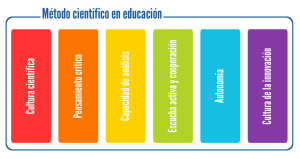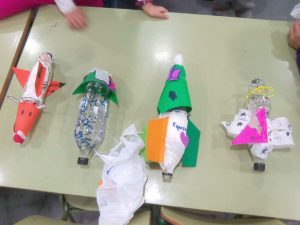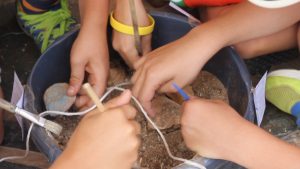Active and participative methodologies applied to teaching science. In this course we explore different approaches to STEM in order to raise the students’ motivation and reduce the underachievement in science and maths, which is a priority at European level.

Traditionally, the education of science was limited to unilateral transmission of knowledge discovered by scientists, leaving aside the practice of science outside of the classrooms and losing all the benefits that it can bring to pupils.
Teachers need new skills and a different approach to teaching STEM in order to reduce the underachievement in maths and science, which is a priority at European level.
This course is composed of dynamic exercises and games, experiments to be done in groups, debates and reflections with which an active and participatory methodology for educating using science will be shown in a practical way.
The nature of this course is eminently practical, with participatory and dynamic activities in which we will carry out the experiments meant to facilitate the assimilation and analysis of the proposed methodology.
Objectives:
- Reflect on the different styles of teaching science.
- Increase awareness about the need to reduce the underachievement in maths and science at European level
- Understand the scientific method and its benefits.
- Learn to apply the scientific method in everyday thinking.
- Acquire active methodological tools that encourage participation, cooperation and motivation of students.
- Learn simple experiments with low cost, that are adapted to the curriculum of Primary Education.
- Gain knowledge on how to adapt science experiments to make them less guided and give more autonomy and research abilities to students.
- Reflect on the importance of educating critical thinking and autonomous approach when searching for information.
- Learn how to foster positive group dynamics and encourage collective learning.
Target audience:
Teachers from primary and/or secondary schools, teachers trainers, school leaders and professional workers that are interested in new ways of teaching STEM.
For groups of 8 teachers or more, we adapt the course content and approach to the specific needs of your educational center and offer personalized funding assistance.
Training activities:
Day 1
- Presentation of the training course.
- Group dynamics: Getting to know each other.
- Reflection exercise: What is education?
- Group experiment: Experiments and demonstrations.
- Group dynamics: Generating an open attitude in the group and raising energy.
- Reflection and group discussion: Identify and compare different methodologies.
- Inspiring experiment: “Animated animals”.
Day 2
- Group dynamics: Breaking the ice.
- Practical activity: The spiral of science.
- Reflection exercise: How to apply the scientific method in the classroom?
- Group experiment: “Air, are you there?”
- Group activity: Hunters by the method.
- Challenge in pairs: “From Earth to the Moon”
Day 3
- Group dynamics: Energizer for fostering collective learning
- Reflection and debate: What does science teach us?
- Group experiments: Learning by discovery and investigation.
- Practical activity: Sequencing of an active science activity.
- Individual challenge: “Place it in the orbit”
- Group experiments: Learning based on challenges.
- Presentation and delivery of documentation: Promotion of scientific vocations in girls.
Day 4
- Group dynamic: Energizer for encouraging team building
- Reflection in small groups: Attitude of the teacher as a guide of Inquiry Based Learning.
- Experiments to work different parts of the scientific method.
- Practical activity: Design of an experimental workshop removing a piece of the puzzle.
- Educating values: Playing with game theory.
Day 5
- Group dynamics: Energizer and group building exercise
- Group dynamics: Networking skills
- Open discussion on possible future collaborations and planning follow up activities
- Summary of key learning points
- Final course evaluation and feedback
- Validation of learning outcomes and handling certificates
- Cultural activity or guided visit (optional)
Methodology
This course will teach the practical methodological tools and materials for teaching science based on the Inquiry Based Learning and Experiential Learning methodologies.
During the course, the participating teachers will be able to see different experiments, exercises and scientific projects that can be used in primary school classrooms. Through challenges and games, the pupils can investigate and invent, so they become actors of their own learning. Thus, the central role of the educators is that of companions and learning guides,
We will explore the different roles that the teachers can take, such as facilitators and learning guides during the investigation and how to leave the protagonist role to the learners so that they get familiarized with the scientific methods.
We will also explore how the learning of the scientific method can be used as a basis for the stimulation of critical thinking, which is very important for distinguishing reliable information in the era of over-information.
Pre-register to our courses!
Write us some details about your project idea. How many participants do you want to send? What are the profiles of the teachers/staff interested in the course?




